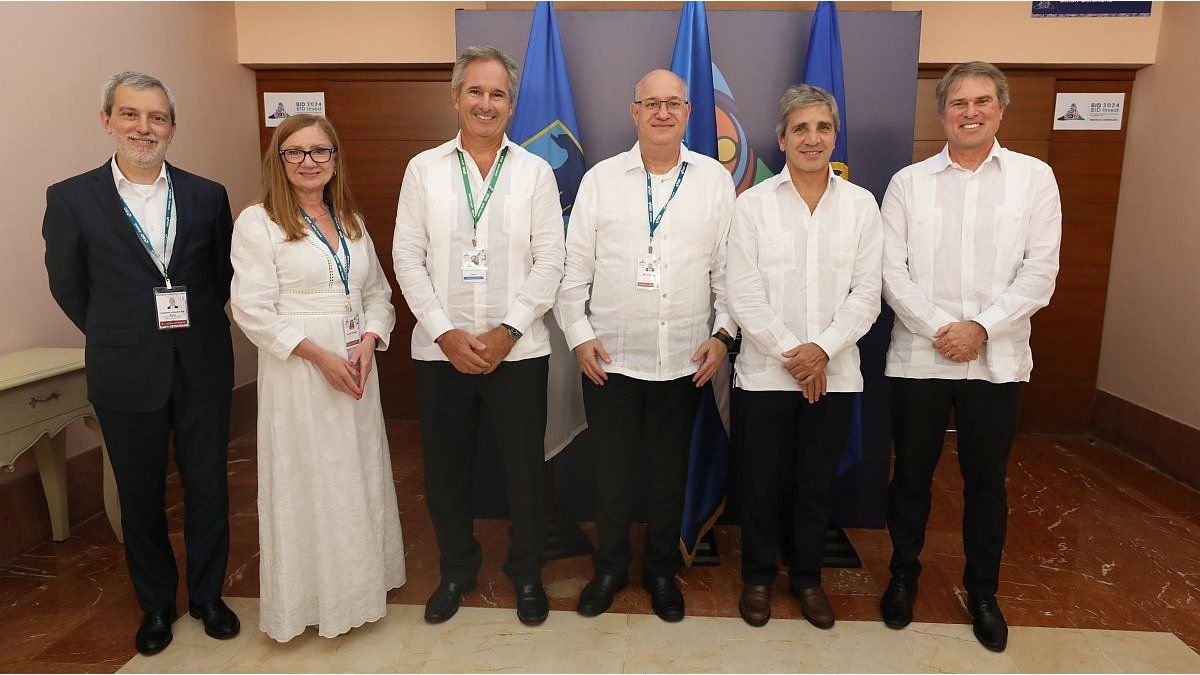In addition to the United States, the list currently includes Canada, Barbados, Chile, Colombia, Costa Rica, Dominican Republic, Ecuador, Mexico, Panama, Peru and Uruguay.
Businesses such as lithium in the north, better known as “white gold”, were mentioned repeatedly during the Annual Meeting of the Inter-American Development Bank (IDB) that takes place in this city. Although, there is still some caution about the future of the country in the coming years.
Embed – https://publish.twitter.com/oembed?url=https://twitter.com/igoldfajn/status/1766543759594897464?s=48&partner=&hide_thread=false
Caputo had an intense agenda within the framework of the annual meeting of the Inter-American Development Bank (IDB) that takes place in this city.
The day began with a meeting with Chris Dodd, former United States senator and one of President Joe Biden’s closest advisors. During the meeting they talked about how to continue strengthening the bilateral relationship and the economic reforms that are being carried out in the country.
It was within the framework of the third day of the Annual Meeting of the Assembly of Governors of the IDB. In the morning, the Business Forum was held, where investors, officials and companies met to talk about the future of business and the conditions that must exist in the region to attract more foreign capital.
Chinese, American and European delegations walked through the hallways.
Part of Minister Caputo’s agenda also focuses on attracting the arrival of investments from the private sector.
Beyond the Governors’ Meeting, the official put together a busy agenda for this weekend with bilateral meetings with authorities from the IDB Invest, Fonplata, the French Development Agency (AFD), and the Japan Bank for International Cooperation (JBIC). , from the Bank Although the figure is similar to Brazil, the rest of the neighboring countries such as Chile and Uruguay have numbers well below.
The Secretary of Finance, Pablo Quirno, met with the governor of the Japan Bank for International Cooperation (JBIC), and Nobumitsu Hayashi, Resident Executive Officer, Regional Head for the Americas. As detailed from the Treasury Palace, JBIC authorities highlighted the economic results of Argentina and ratified their interest in cooperating not only through financing direct investment from Japanese companies already established in the country, but also with new investors.
The focuses of interest for the Japan Bank for International Cooperation are cooperation and financing opportunities in the mining and energy sectors.
“They are identified as key sectors for the economic development of both countries,” they highlighted.
Argentine potential did not go unnoticed by Ilan Goldfajn, president of the IDB. In his opening remarks at the Forum, he noted that IDB Invest, the arm of the multilateral lending organization that focuses on the private sector, last December provided a US$50 million loan to global lithium producer Allkem. .
“This will help us promote the development of the low-carbon and climate-resilient private sector in Argentina,” he added.
Lithium in northern Argentina was mentioned in several panels, since it is a key mineral for the energy transition. Both Argentina, Chile and Bolivia make up the lithium triangle, which together represent around half of the world’s reserves. In recent years, this has been a magnet for millions of dollars to pour into the country from companies from the United States and Australia, among others.
“There is enormous potential in the region for the production and processing of minerals critical for the energy transition.
It is impossible to think of the transition without lithium or copper. “Latin America has a strong position, but can advance even further,” said Alejandra Bernal Guzmán, Latin American Program Officer at the International Energy Agency (IEA).
In the same sense, Goldfajn pointed out, who highlighted that the Latin American and Caribbean region grew faster than expected in recent years, driven mainly by the largest countries in the region. Even in 2022, foreign direct investment skyrocketed and marked a rate that “will probably equalize again in 2023,” according to initial data.
“The question we must ask ourselves is: will this recent performance that was better than expected last? It all depends. It depends on whether Latin America and the Caribbean can take advantage of this global opportunity that the region offers us, it could be a potential turning point” , he remarked.
But, for that, certain conditions have to be met that apply to all of Latin America. For example, according to IDB figures, crime costs the region 3.5% of GDP per year (when broken down, in Argentina it represents US$29.38 billion annually). This percentage is double that of developed countries. Meanwhile, despite being 8% of the world’s population, 30% of global murders occur here.
Caputo also met with Croatian Finance Minister Marko Primorac to review bilateral relations, and the potential for economic and trade cooperation in the short term.
“Special emphasis was placed on the macroeconomic organization process that allows laying the foundations of stability and predictability to attract direct investments,” they said from the Treasury Palace.
He also met with the Minister of Planning and Budget of Brazil, Simone Nassar Tebet, a meeting in which they discussed the possibility of working on a roadmap for regional integration and the governance of multilateral organizations that integrate both countries in the infrastructure development that allows greater trade opportunities.
In that talk, the Minister of Economy highlighted the key role that the country has in supplying the demand of the Brazilian industry.
To this end, he invited Brazilian companies and banks to participate in investing and financing the development of the gas, mining, and electric generation and transportation industries in the country.
On Thursday, in a nod to Argentina, the Brazilian official supported Argentina to receive a loan from CAF for US$400 million for food security.
Caputo’s agenda also included a meeting with the Minister of Economy and Finance of Paraguay, Carlos Fernández Valdovinos; and with the Executive President of FONPLATA, Luciana Botafogo Brito, after Argentina ratified its membership in the development bank.
Source: Ambito




